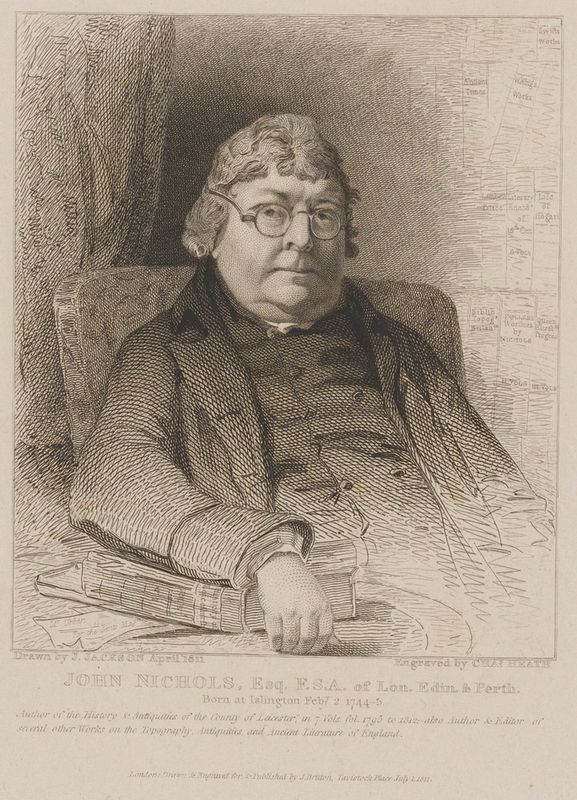John Nichols (1745–1826; fl. 1766–1823)
John Nichols, printer, 1766–1823; in Whitefriars 1766; at 4, Red Lion Passage, Fleet Street 1767–1820; at 10, King Street, Westminster 1817–1830; at 25, Parliament Street 1818–1830. Traded with William Bowyer 1766–77; alone 1777–99; as Nichols and son 1800–11; as Nichols, son and Bentley 1812–19; as Nichols and son 1820–30.
Dictionary of National Biography (1885–1900)
NICHOLS, JOHN (1745–1826), English printer and author, was born in Islington on the 2nd of February 1745. He edited the Gentleman's Magazine from 1788 till his death, and in the pages of that periodical, and in his numerous volumes of Anecdotes and Illustrations, he made invaluable contributions to the personal history of English men of letters in the 18th century. He was apprenticed in 1757 to "the learned printer," William Bowyer, whom he eventually succeeded. On the death of his friend and master in 1777 he published a brief memoir, which afterwards grew into the Anecdotes of William Bowyer and his Literary Friends (1782). As his materials accumulated he compiled a sort of anecdotal literary history of the century, based on a large collection of important letters. The Literary Anecdotes of the 18th Century (1812–1815), into which the original work was expanded, forms only a small part of Nichols's production. It was followed by the Illustrations of the Literary History of the 18th Century, consisting of Authentic Memoirs and Original Letters of Eminent Persons, which was begun in 1817 and completed by his son John Bowyer Nichols (1779–1863) in 1858. The Anecdotes and the Illustrations are mines of valuable information on the authors, printers and booksellers of the time.
Nichols's other works include: A Collection of Royal and Noble Wills (1780); Select Collection of Miscellaneous Poems (1782), with subsequent additions, in which he was helped by Joseph Warton and by Bishops Percy and Lowth; Bibliotheca Topographica Britannica (1780–90); with Richard Gough, The Progresses and Public Processions of Queen Elizabeth (1788); and the important History and Antiquities of the Town and County of Leicester (1795–1815). Nichols was a fellow of the Society of Antiquaries, a trustee of many city institutions, and in 1804 he was master of the Stationers' Company. He died on the 26th of November 1826. John Bowyer Nichols continued his father's various undertakings, and wrote, with other works, A Brief Account of the Guildhall of the City of London (1819). His eldest son, John Gough Nichols (1806–73), was also a printer and a distinguished antiquary, who edited The Gentleman's Magazine from 1851 to 1856, and the Herald and Genealogist from 1863 to 1874, and was one of the founders of the Camden Society.
A full Memoir of John Nichols by Alexander Chalmers is contained in the Illustrations, and a bibliography in the Anecdotes (vol. vi.) is supplemented in the later work. See also R. C. Nichols, Memoirs of J. G. Nichols (1874).
A Dictionary of the Printers and Booksellers who were at work in England, Scotland and Ireland from 1726 to 1775, by Henry Plomer et al. (1932)
Nichols (John), F.S.A., printer in London, Red Lion Passage, 1766–1826. Son of Edward Nichols, of Islington, and Anne his wife. Born at Islington February 2nd, 1744/5. Educated at a school kept by John Shield. Apprenticed to William Bowyer, the printer, in 1757, before he was thirteen years of age. His industry and integrity won the esteem of his master, and in 1766 he was taken into partnership and eventually succeeded to the business. In 1775 he issued a supplement to Hawkesworth's Life of Swift in his edition of Swift's works, and in 1778 became associated with the Gentleman's Magazine, of which he remained editor for nearly fifty years. The bulk of his life-work lies outside of the scope of this volume. He was Master of the Stationers' Company in 1804, and died October 26th, 1826.
Exeter Working Papers in British Book Trade History, ed. Ian Maxted (2005–)
NICHOLS, John, printer, Whitefriars 1766; 4, Red Lion Passage, Fleet Street 1767–1820P; 10, King Street, Westminster 1817–1830P; 25, Parliament Street 1818–1830P+. Trading: with William Bowyer 1766–77; alone 1777–1799L; as Nichols and son 1800–1811P, as Nichols, son and Bentley 1812–1819P; as Nichols and son 1820P–1830P+. B. 2 Feb. 1745, Islington, s. of Edward N., baker; d. 26 Nov. 1826, Highbury. App. William Bowyer II £20 1759, free and livery Sta. Co. 1766, master 1804, 1766–99 20 apps. 6 premiums average £35. Ed. in Islington at school kept by John Shield. Attempted to obtain Cambridge University privileges 1765. Partner with Bowyer 1766. Succ. Bowyer on death 1777. Associated with Gentleman's magazine from 1778, sole manager 1792 to death. Edited and publ. Biographical memoirs of William Ged 1781. Publ. Domesday Book edit. By William Farley 1783. Facsimile types cut by Joseph Jackson destroyed in fire at Nichol's office 1808. Common councillor (Wilkite) Farrington ward without 1784–1811. Signed compositor's scale 1785. Offices destroyed by fire 7 May 1786. Registered presses 1799, 1800. Son John Bowyer N. taken as partner by 1800, ran business when father retired apart from occasional activity 1803. Office and stock destroyed by fire 8 Feb. 1808. Samuel Bentley partner 1812–18. Transferred £500 4 per cent annuities to Sta. Co. 1817, also presented several ports. to Co. Fellow of various antiquarian societies and author or editor of over 50 pubis., many historical. Friend of Dr. Johnson. Twice married, son by second wife his partner and successor. City Poll 1781: C. Imprint(s): Kress: 1777: S4885; 1778: S4925; 1780: B335, S4956, 4960; 1785: B955; 1789: B1523; 1790: B1994; 1793: B2576, 2636; 1794: B2713, 2760, 2796–97, 2821, 2841; 1795: B2880, 3024; 1797: B3475; 1798: B3735; 1799: B3916; 1800: B4237. Abbey: 1792: AT48. DNB; Plomer; Nichols, pass.; Timperley 832, 867; Howe; Todd; Brown. [Abbreviations and sources] (CC BY-NC 4.0)
